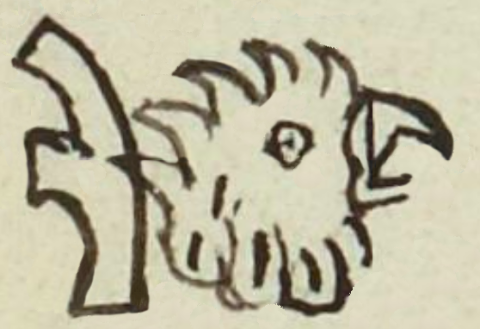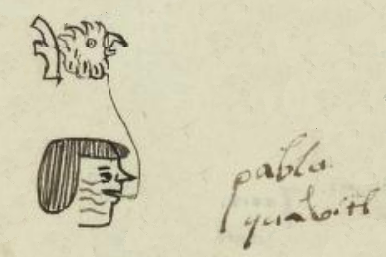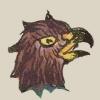Cuahuitl (MH631v)
This compound glyph for the personal name Cuahuitl covers its bases. It includes, on the left, a tree (cuahuitl) trunk, and on the right there is an eagle's (cuauhtli) head in profile facing toward the right. The tree trunk has stubs from branches that have been removed, similar to the tzihuactli and necuametl glyphs. The eagle's head is white (like a bald eagle). Its beak is slightly open.
Stephanie Wood
The combining form for both nouns, tree and eagle, is the same: cuauh-, although, as Gordon Whittaker (2021, 90) points out, the vowel length is different, with cuauh- for tree/wood and cuāuh- for eagle. So, these are near homophones in the stems. In this case, the gloss says Cuahuitl, which would easily be represented by a glyph of a tree or some wood. But perhaps the artist was concerned that the reader might read it as ocotl (torch pine) or some other tree. So, he added the eagle to ensure a phonetic reading that would start cuauh-. If so, then the eagle is a phonetic complement which helps ensure the correct reading. Another example of this glyph has a similar arrangement, but it has added color.
Why a Nahua man would have a name relating to tree or wood may have something to do with the significance of the metaphor, in tetl in cuahuitl (the stone, the wood), which the friars (such as Sahagún, Book 6) described as having an association with knowing secret things.
Stephanie Wood
1560
Jeff Haskett-Wood
wood, madera, trees, árboles, águilas, nombres de hombres

cuahui(tl), tree, wood, https://nahuatl.wired-humanities.org/content/cuahuitl-1
cuauh(tli), eagle, https://nahuatl.wired-humanities.org/content/cuauhtli
Erik Velásquez García (2019, 77) discusses KwAW-KwAW (without identifying if it is this example in particular) as a logogram-homophone in the manner of a rebus.
Árbol
Stephanie Wood
Matrícula de Huexotzinco, folio 631r, World Digital Library, https://www.loc.gov/resource/gdcwdl.wdl_15282/?sp=345st=image.
This manuscript is hosted by the Library of Congress and the World Digital Library; used here with the Creative Commons, “Attribution-NonCommercial-ShareAlike 3.0 License” (CC-BY-NC-SAq 3.0).






